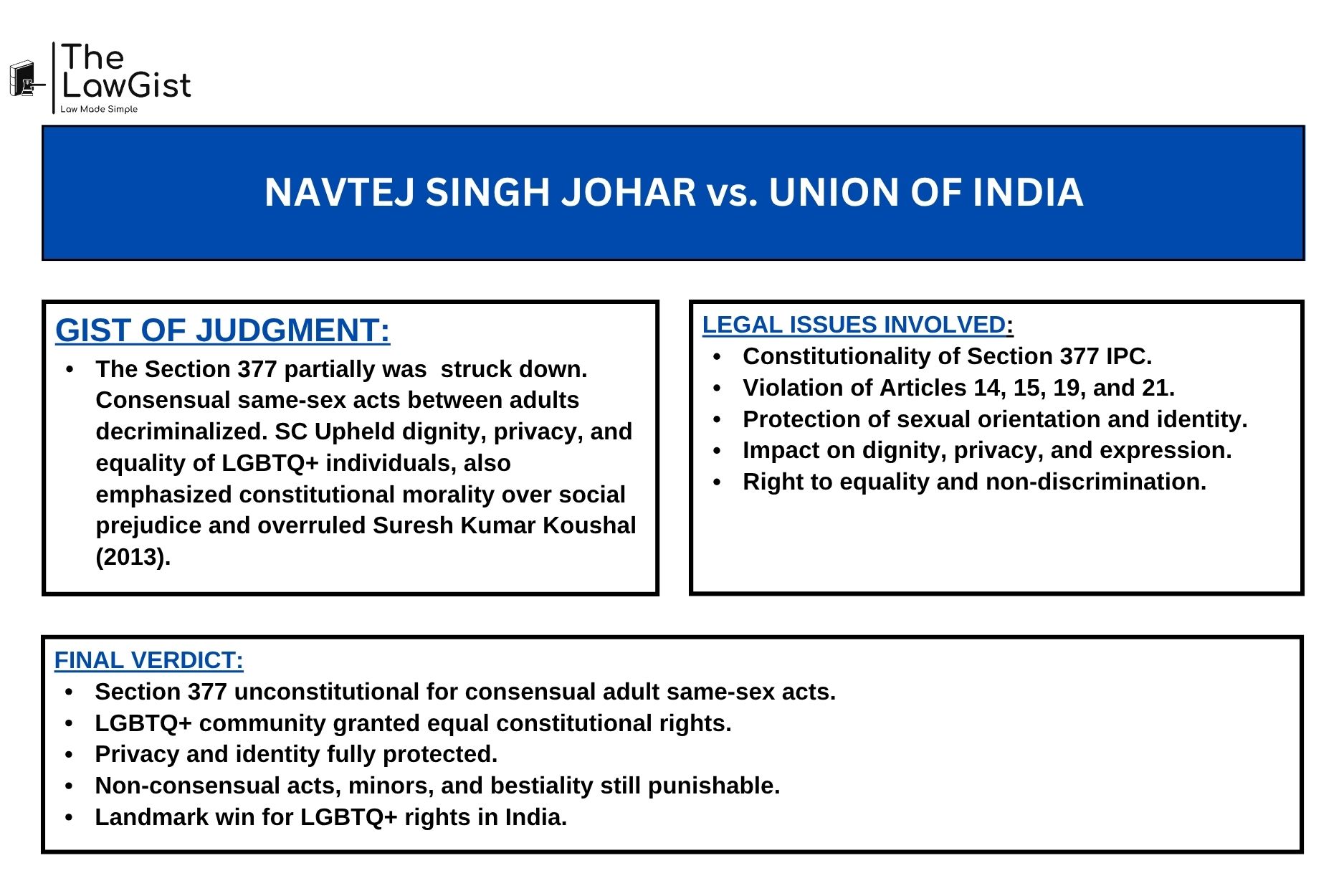
Historic 2018 Supreme Court judgment that struck down parts of Section 377 IPC, upholding LGBTQ+ rights in India.
Gist of JudgmentThe Supreme Court decriminalized consensual homosexual acts between adults by partially striking down Section 377 of the IPC (now BNS), holding it unconstitutional insofar as it criminalized consensual sexual conduct between adults of the same sex. The Court emphasized that the LGBTQ+ community is entitled to the full range of constitutional rights and freedoms, including dignity, privacy, and equality . |
| Judgment Date – 6th September 2018 Bench – Dipak Misra (CJ), A.M. Khanwilkar, Rohinton Fali Nariman, D.Y. Chandrachud, Indu Malhotra Citations – (2018) 10 SCC 1, AIR 2018 SC 4321 |
Legal Issues
The legal issues involved in this case are discussed below –
- Constitutionality of Section 377 of the Indian Penal Code .
- Right to privacy, dignity, and autonomy under Article 21 .
- Equality before law under Article 14 .
- Freedom of expression and identity under Article 19(1)(a) .
- Protection against discrimination based on sexual orientation .
Highlights of Judgment
The highlights of this landmark judgment are mentioned below –
- Reaffirmed the right to privacy, dignity, and identity under Article 21 as part of personal liberty .
- Held that Section 377 was arbitrary and discriminatory, violating Article 14 .
- Recognized sexual orientation as an essential attribute of identity, protected under Article 19(1)(a) .
- Overturned the precedent in Suresh Kumar Koushal vs. Naz Foundation (2013) .
- Quoted extensively from Puttaswamy vs. Union of India (2017) to uphold sexual autonomy .
- Asserted that constitutional morality must prevail over societal morality .
- Declared that members of the LGBTQ+ community are entitled to equal citizenship and protection of the law .
Final Verdict
The Supreme Court struck down parts of Section 377 IPC that criminalized consensual same-sex relations among adults, declaring them unconstitutional and violative of fundamental rights. However, Section 377 remains applicable to non-consensual acts and acts involving minors or animals .
Impact of Judgment
The impacts of case Navtej Singh Johar vs. Union of India are discussed below –
- Landmark victory for LGBTQ+ rights and recognition of same-sex relationships in India .
- Strengthened constitutional jurisprudence on privacy, dignity, and non-discrimination .
- Catalyzed social and legal reforms for LGBTQ+ inclusivity .
- Set the stage for future litigation around civil rights such as same-sex marriage, adoption, and anti-discrimination laws .
- Affirmed the judiciary’s role in safeguarding minority rights against majoritarian prejudices .
Related Judgments
- Suresh Kumar Koushal vs. Naz Foundation (2013) – Overruled
- Naz Foundation vs. Government of NCT of Delhi (2009)
- National Legal Services Authority vs. Union of India (2014)
“What is natural to one may not be natural to another. But the fundamental rights are not subject to majoritarian morality.” — Justice Indu Malhotra
SOURCE – NAVTEJ SINGH JOHAR vs. UNION OF INDIA
ALSO READ – Maneka Gandhi vs. Union of India (1978)







